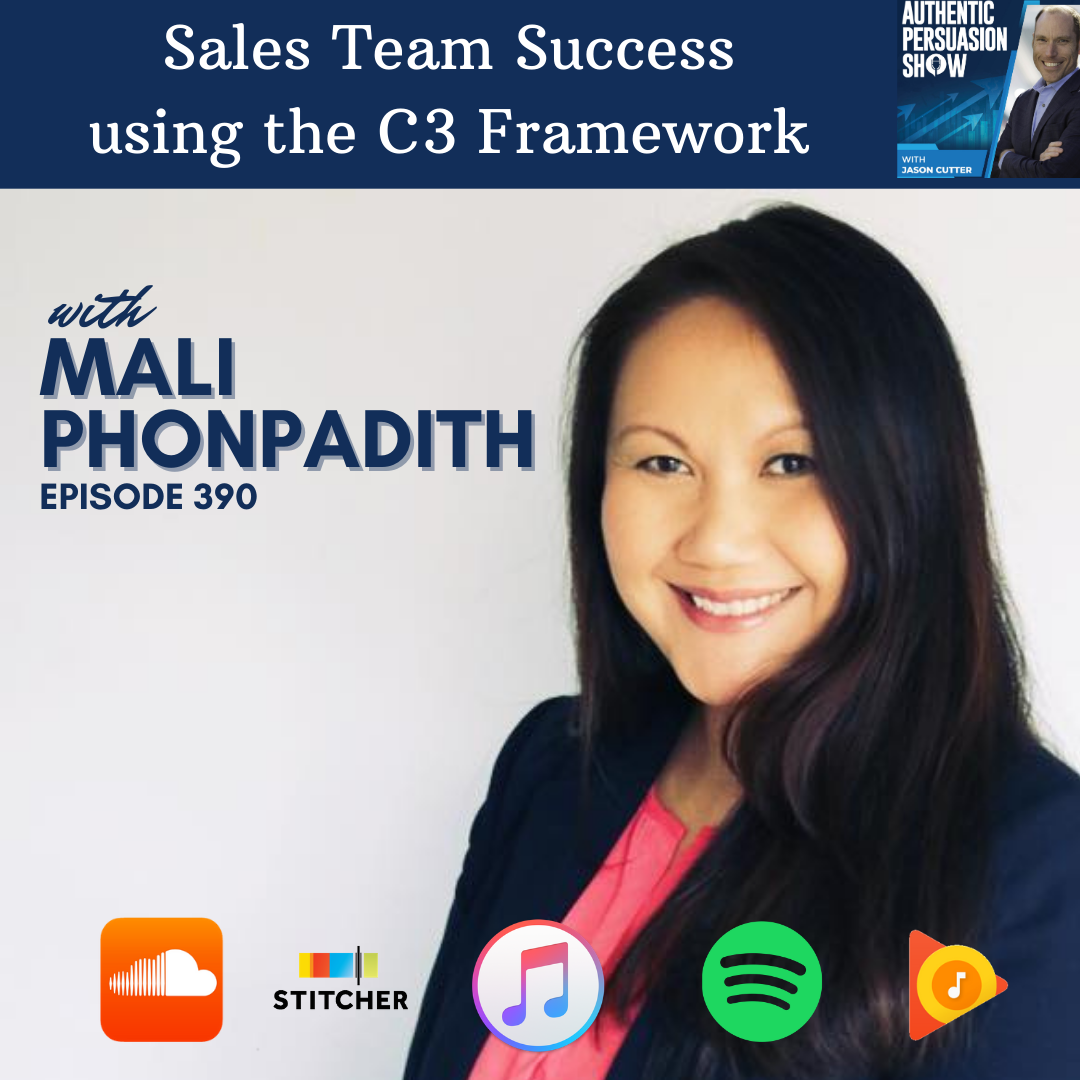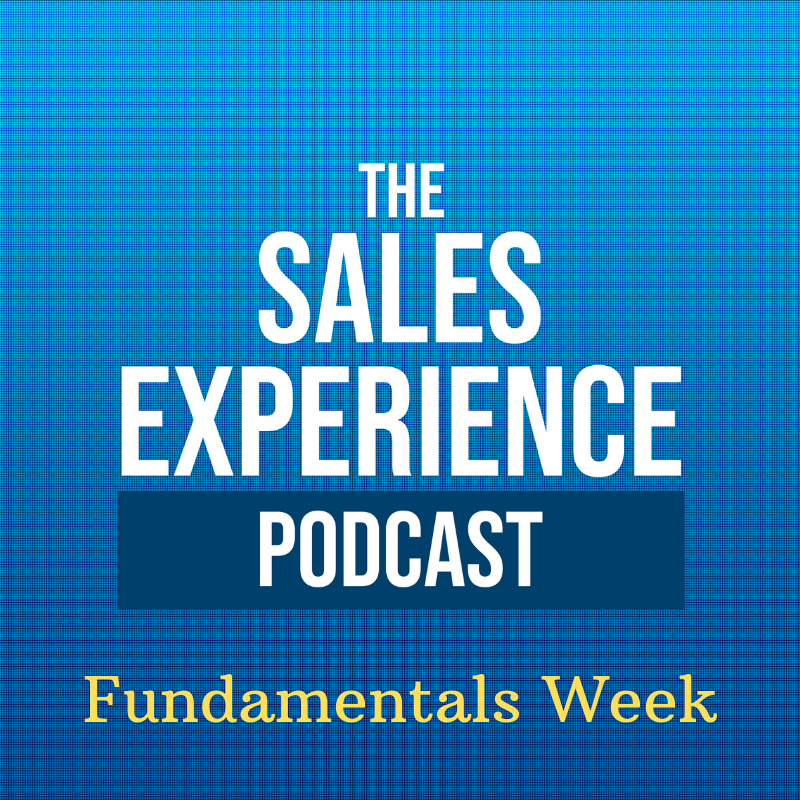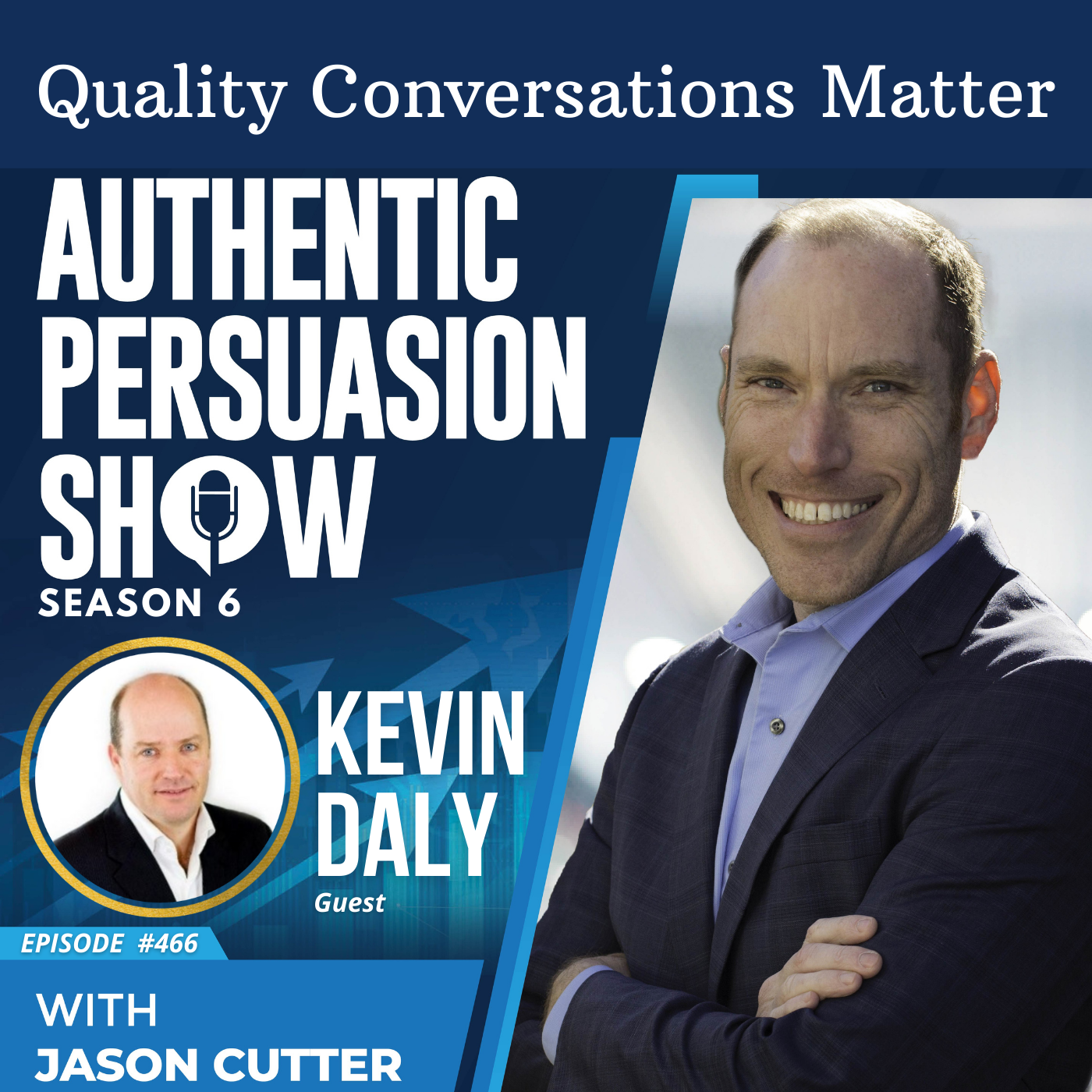Show Notes
This is the third segment of the conversation I had with Eric.
In Part 3, Eric and I talk about:
- Credit risk data for business prospecting
- Are your reps actually selling the clients you want?
- Utilizing data triggers to maximize timing of your prospecting efforts
Download The Power of Authentic Persuasion ebook
Enroll in the Authentic Persuasion Online Course
Connect with Jason on LinkedIn
Connect with Eric on LinkedIn
Eric’s Bio:
Eric is the Senior Vice President & General Manager for Credit Solutions at Infogroup. Credit.net provides in-depth information on businesses of all sizes, including small businesses:
•To empower people with the ability to make smarter business credit decisions.
•Identify opportunities in the industry, unmet customer needs, core competencies of Infogroup
•Cross-selling to existing customers, and partnership possibilities
•Create detailed roadmap including resources and investments needed
•Product Improvements envisioned, partnerships channels, go to market and sales changes, etc.
•Refine product offerings and develop new solutions based on market feedback
•Collaborate across Infogroup to drive cross-selling and leverage the broader platform of services.
•Work with the executive leadership team and present to Board growth strategies, investment requirements, and acquisitions.
Eric holds a bachelor’s of arts degree in economics and government from Skidmore College in New York. His post-graduate studies were in business administration, management, and operations from Sheffield Hallam University in the United Kingdom.
Eric’s Links:
LinkedIn: https://www.linkedin.com/in/erickider/
Infogroup: https://www.linkedin.com/company/infogroup/
Credit.net: https://www.linkedin.com/company/credit-net/about/
Facebook: https://www.facebook.com/Infogroup/
Twitter: https://twitter.com/Infogroup
E178 – Transcript
Jason: Hey there. Welcome back to the sales experience podcast and welcome to part three of my conversation with Eric Kider from Infogroup. If you haven’t already, make sure to subscribe to the podcast and check out parts one and two where we continue our conversation talking about performance, metrics, data profitability of marketing. We’re focusing on performance-based marketing, not branding, marketing, and having some kind of rate of return and how valuable that is and making sure that you’re doing it in a proper way for your organization. So again, it’s not always about spending lots of money on data or on marketing, it’s about knowing your numbers, knowing what you’re trying to achieve and what your goals are for your business. And then working backwards to determine what’s the best way for you to get there. So here you go, part three, enjoy.
Eric: And a lot of them now using the first quarter, you know, between January and March, to really accelerate those marketing efforts in order to start bringing in some real strong quality leads for them to really exit into February, March, and age into really building into the trajectory of growing their business in a very positive way. They’re really accelerating in more so these days because of what’s happening in the economy.
Jason: Well, and I know based on the conversations that I’ve been having with business owners, managers, and even salespeople in the past three to six months, they’ve been centered on the fact that everybody knows there will be some economic downturn. Right? So you’re listening to this. This is the first quarter of 2020 and depending on when you listen to this could be either accurate or inaccurate in forecasting it, but everyone knows that we can’t see, you know, these good times that we’re in right now can’t sustain forever. And there’s a lot of people who either aren’t winning even when it’s good like this, or they’re winning and they’re worried because it may not be built on some fundamentals. And a foundation and you know, if anything changes in the market, how are they going to be recession-proof in their industry?
Eric: Yeah. Well, and that’s kind of why you’re absolutely right, because everybody is watching, you know, the market hit both 29,000 you know, and you go watch all the experts. And by the way, all the experts have different viewpoints on how, and everybody’s riding this wave right now while it’s still a wave. But you know, the thing that we also started to talk about it, and I know it was something that you know, we raised before to some of our clients is this whole concept that while things are our very good plan for that, of when the bubble will hit, even though we don’t know when the bubble will burst. And so we’ve been introducing, you know, cause people think about credit solutions and credit.net by that of just what it means, which is more credit and risk based services that we offer our clients. But as Infogroup, you know, we’re trained in offering the complete suite of marketing sales.
Eric: You know, data services were, includes as you know, the match cleanse and upended one’s customer files. You know, we do the full suite of everything, including even helping with marketing campaigns and be including in developing the creative. But one of the things that we now started to introduce is taking the credit risk dimension and putting it into more of a profitability based prospecting discipline. And we started to introduce that to a lot of our clients. And it’s beginning to resonate because while times are good, they’re loving the fact that we’re getting in there getting business generated and the very quality and the dimension of leads coming into them. But at the same token, we’ve been working with the finance and credit and risk officers and groups inside of organizations in order to have them not be a back office function, Jason, but helping them bring all of their knowledge and insights into what really does comprise a best customer and the most profitable customer into and working with their sales and marketing teams.
Eric: And I’ll tell you the conversations that we’re helping to facilitate are bringing finally finance into the front end of the process and it’s helping to improve that discipline that says finance don’t, it doesn’t necessarily have to be the naysayers or the negative dimensions into helping or stopping a company from growing but imposing different credit rules or decision criteria. On the contrary, they can be helping to improve that of identifying what do the best customers look like. Not by using your traditional marketing terminology like those that have accepted your offer or have clicked through your email campaign. Those are critical metrics. Don’t get me wrong Jason, but the ones that accept the offer and that pay you on time consistency, that’s the one customer you’re trying to look and model after and therefore they are even creating this dynamic that says if you’re working with your finance team and your order of credit decision person on the front end, the sales people don’t have to worry about credit decisioning and going through the back process cause the leads that they’re getting have already been pre-approved. No different than how like an American express or any of the credit card issuers today sends you out a campaign that says, Jason, you’ve been preapproved for $50,000 credit card. Right? That same concept. So in this case we’re bringing that profitability based prospecting into the dialogue. When people think about doing their campaigns. And I’ll tell you it’s finally helping the finance person smile during these meetings cause they’re saying we are an enabler of the business. Don’t look at us as a disabler. So it’s kind of refreshing now.
Jason: Well and it’s a dramatic shift because you know, and this is one of the things I work on with a lot of clients and companies that have been a part of is where there’s this attitude on the sales side where more prospects are better, more leads are better. Just give us more people and I can close anyone at any time. And you know, there’s a lot of great salespeople out there, but there’s also a lot of organizations where the culture is still the classic one where it’s all about closing the deal, short term moving on and never looking back from a sales perspective. And the downside. And the challenge with that is, are you producing an actual good customer for the business? Which is, you know, kind of what my focus is with this podcast being the sales experience.
Jason: It’s the experience of the sales rep, the experience of the company, the experience the customer then has short term and long because it all starts from the marketing all the way through the fulfillment and the customer satisfaction side. But you know, salespeople, the classic one is, you know, just give me enough leads, I’ll close them and make it somebody else’s problem. If they don’t pay or if they’re not profitable, then it’s not, you know, it’s not their issue. And I think what’s more important, like you’re saying is, is it a profitable person? So getting operations, getting finance, no matter what vertical you’re in, no matter what you sell is, is that somebody you want to deal with is you know, what kind of customers make up your most profitable ones from a lifetime value standpoint and where can you get more quality customers instead of just quantity customers?
Eric: Absolutely Jason. And you know, the thing that people have been asking me is, well, do I really need a full credit department or finance department? And I spoken to two businesses that have only five employees. And I said, look, whoever does your credit decisioning or whatever type of credit review process you have, we ultimately can help you put that process into action to help you improve your overall prospecting. And this person said, well, what do you mean? I said, well, when you think about going after your best customers, let’s look first at who and what would be the composition of what does compile or comprise your best customer. Let’s define that first. And then from there, what’s interesting is we then build in triggers, not only to help identify the prospect universe modeling after their best customers, but we actually help that person in that organization identify triggers of what events may take place using our data.
Eric: So that way they can also reach out proactively to their current clients to upsell and cross-sell. And that’s something that companies today all do by the way. So cross-sell is not a new discipline, Jason, as you know. You know you’ve done these before your podcast, but you know what’s interesting is that people don’t realize that there are triggers and the triggers could be positive in which you could tell your salesperson, Hey, go call Jason incorporated. It seems like they’ve got actually an interesting either infusion of cash or they’ve got an improvement in their credit rating that may, in fact, allow us to extend even further their line of credit. So instead of a $30,000 line, you can tell them now that we’ve increased in the 50,000 and by doing that, you’ve now potentially opened up a whole different opportunity for them to buy more products from you.
Eric: You don’t have to wait for them to ask for the order, the order and that you know. And on the flip side, the alerts could also help you mitigate risk is if a company is actually having or showing some signs of financial difficulty, your finance person could send that alert to the salesperson and therefore they could actually watch closely or change the way in which they would offer terms to that client. Instead of offering net 30 maybe they’ll ask for 50% upfront and then pay me back, you know, within two weeks. So I always tell people don’t say no to a company even though they may not have the financial strength. Just change your terms, you know, get ACH payment for example upfront. Don’t let them have net 30 or net 45. Exactly. Exactly.
Jason: Well, and so, you know, we’re talking about this profitability, the lifetime value. It’s always amazing to me how many companies don’t know that they don’t know the lifetime value, the profitability of their customers. They don’t know which ones are the most profitable. And that’s one of the biggest things that I do when I start talking to an organization. They don’t know what those numbers is. We just do the analysis, figure out who is most profitable, who do you want in your pipeline full of customers and what’s their lifetime value? Because then, you know, and this is wrapping this full circle back around to where we started with the data and the quality and you know the potential costs, right? Cause it’s, it’s more expensive when you’re getting better data from the source that’s confirmed by, you know, telephone operators, making sure that it’s valid, but you know, it really just comes down to if you know that lifetime value for, you know, the profitability of your customers, then you can back into, well what’s that cost per acquisition of a new customer?
Jason: What am I willing to spend? Right? If a new customer equates to $10,000 in revenue for me, what am I willing to spend to acquire? A new customer is at 5,000 is it 1000 you know, relative to everything else that you have going on and what your goal is, right? Versus that guy who wanted a one to one. You know, what is your ratio, especially with your overhead? And so if you set that number, let’s say at a hundred or a thousand dollars cost per acquisition, then you know, working backward from there and being smart and sending out quality messages to the correct contacts instead of, you know, pray and spray model, then you know, then it makes sense, right? Even if you’re buying more expensive data, you’re doing more expensive mailers or digital marketing, then you know, as long as you’re meeting that thousand dollar cost per acquisition or whatever you set, then the numbers make sense.
Jason: Alright, everybody, that’s it for part three. Again, make sure you’re subscribed, share this podcast, rate it, rank it, everything that’s possible. Wherever you’re getting. If you want the transcripts, show notes or Eric’s links, go to cutterconsultinggroup.com again, thank you for listening to this episode, to this series. Hopefully, it’s valuable. Hopefully, it’s something that’s helping you with your sales or marketing careers, and as always, keep in mind that everything in life is sales, and people remember the experience you gave them.
![[E178] Leveraging Prospect Data with Eric Kider – Part 3 of 4](https://episodes.castos.com/salesexperiencepodcast/images/Eric-Kider-Profile-Pic.png)


